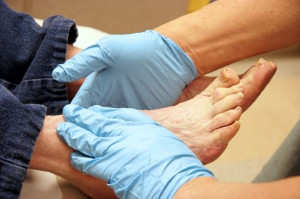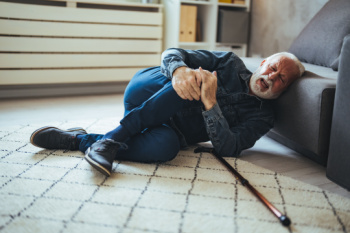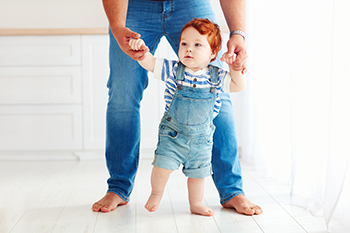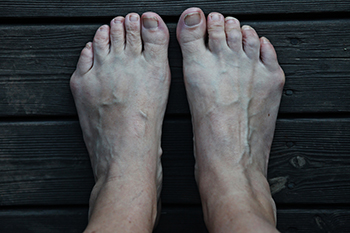Items filtered by date: May 2024
Suggested Foot Care For Diabetic Patients

Diabetes can pose significant risks to foot health due to potential nerve and blood vessel damage. Reduced sensation in the feet increases the likelihood of injuries, which may lead to serious complications like foot ulcers, often requiring hospitalization. It is important for anyone with diabetes to prioritize foot care to prevent such issues. Daily foot inspections are vital, checking for dry skin, blisters, sores, bruises, and any abnormalities. Regular washing with mild soap, careful drying, and moisturizing are also essential steps. Proper toenail trimming techniques help to prevent ingrown nails and other complications, with assistance from a podiatrist recommended for thick or discolored nails that may be infected. Corns and calluses should also be managed by a podiatrist, ensuring safe removal. Wearing well-fitting shoes and clean, dry socks are recommended at all times to prevent injuries. Any foot issues should be promptly reported to a podiatrist, rather than attempting self-treatment. It is suggested that diabetic patients seek assistance from a podiatrist for regular evaluations and necessary foot care.
Diabetic foot care is important in preventing foot ailments such as ulcers. If you are suffering from diabetes or have any other concerns about your feet, contact Glenn Aufseeser, DPM from Lakewood Foot and Ankle Specialists. Our doctor can provide the care you need to keep you pain-free and on your feet.
Diabetic Foot Care
Diabetes affects millions of people every year. The condition can damage blood vessels in many parts of the body, especially the feet. Because of this, taking care of your feet is essential if you have diabetes, and having a podiatrist help monitor your foot health is highly recommended.
The Importance of Caring for Your Feet
- Routinely inspect your feet for bruises or sores.
- Wear socks that fit your feet comfortably.
- Wear comfortable shoes that provide adequate support.
Patients with diabetes should have their doctor monitor their blood levels, as blood sugar levels play such a huge role in diabetic care. Monitoring these levels on a regular basis is highly advised.
It is always best to inform your healthcare professional of any concerns you may have regarding your feet, especially for diabetic patients. Early treatment and routine foot examinations are keys to maintaining proper health, especially because severe complications can arise if proper treatment is not applied.
If you have any questions please feel free to contact our offices located in Lakewood and Manchester Township, NJ . We offer the newest diagnostic and treatment technologies for all your foot and ankle needs.
Strategies for Preventing Falls

Preventing falls among older adults is paramount to maintaining quality of life and independence. Various factors contribute to an increased risk of falls in seniors. Among them are muscle weakness, gait abnormalities, and pain. Additionally, certain health conditions like inner ear problems, vision impairment, and arthritis can negatively affect balance and mobility. Medications, such as those for blood pressure and sleep disorders, can induce side effects that increase susceptibility to falls. Through comprehensive assessments and evaluations, a podiatrist can tailor interventions to reduce fall risks. These may involve strength, gait, and balance tests, blood pressure monitoring and vision assessments. Incorporating balance exercises and strength training into daily routines can significantly enhance mobility and stability, thereby reducing the likelihood of falls. Activities targeting core and leg muscles are particularly beneficial, as they play a vital role in maintaining balance and coordination. Using assistive devices, such as canes, walkers or wheelchairs, can provide additional support and safety for individuals with mobility limitations. If you are a senior and have fallen recently or experience balance problems, it is suggested that you schedule an appointment with a podiatrist for a thorough exam to determine what the reason is.
Preventing falls among the elderly is very important. If you are older and have fallen or fear that you are prone to falling, consult with Glenn Aufseeser, DPM from Lakewood Foot and Ankle Specialists. Our doctor will assess your condition and provide you with quality advice and care.
Every 11 seconds, an elderly American is being treated in an emergency room for a fall related injury. Falls are the leading cause of head and hip injuries for those 65 and older. Due to decreases in strength, balance, senses, and lack of awareness, elderly persons are very susceptible to falling. Thankfully, there are a number of things older persons can do to prevent falls.
How to Prevent Falls
Some effective methods that older persons can do to prevent falls include:
- Enrolling in strength and balance exercise program to increase balance and strength
- Periodically having your sight and hearing checked
- Discuss any medications you have with a doctor to see if it increases the risk of falling
- Clearing the house of falling hazards and installing devices like grab bars and railings
- Utilizing a walker or cane
- Wearing shoes that provide good support and cushioning
- Talking to family members about falling and increasing awareness
Falling can be a traumatic and embarrassing experience for elderly persons; this can make them less willing to leave the house, and less willing to talk to someone about their fears of falling. Doing such things, however, will increase the likelihood of tripping or losing one’s balance. Knowing the causes of falling and how to prevent them is the best way to mitigate the risk of serious injury.
If you have any questions, please feel free to contact our offices located in Lakewood and Manchester Township, NJ . We offer the newest diagnostic and treatment technologies for all your foot care needs.
Walking Development of Children

The process of learning to walk is a significant milestone in a child's foot development, marking the transition from dependency to independence. As infants, babies typically begin to explore their surroundings by lifting their heads, rolling over, and eventually crawling. Over time, they develop the strength and coordination needed to pull themselves up and stand with support. As they gain confidence and stability, they take their first tentative steps, often holding onto furniture or caregivers for balance. With practice and encouragement, children gradually refine their walking skills, progressing from unsteady toddling to confident, independent walking. Along the way, they learn to coordinate their movements, maintain balance, and navigate obstacles in their environment. Walking not only facilitates physical exploration but also fosters cognitive and social development, enabling children to engage more actively with their surroundings and interact with others. If your child is delayed in walking, it is suggested that you confer with a podiatrist who can address any concerns you may have.
Making sure that your children maintain good foot health is very important as they grow. If you have any questions, contact Glenn Aufseeser, DPM of Lakewood Foot and Ankle Specialists. Our doctor can provide the care you need to keep you pain-free and on your feet.
Keeping Children's Feet Healthy
Having healthy feet during childhood can help prevent medical problems later in life, namely in the back and legs. As children grow, their feet require different types of care. Here are some things to consider...
Although babies do not walk yet, it is still very important to take care of their feet.
Avoid putting tight shoes or socks on his or her feet.
Allow the baby to stretch and kick his or her feet to feel comfortable.
As a toddler, kids are now on the move and begin to develop differently. At this age, toddlers are getting a feel for walking, so don’t be alarmed if your toddler is unsteady or ‘walks funny’.
As your child gets older, it is important to teach them how to take care of their feet.
Show them proper hygiene to prevent infections such as fungus.
Be watchful for any pain or injury.
Have all injuries checked by a doctor as soon as possible.
Comfortable, protective shoes should always be worn, especially at play.
If you have any questions please feel free to contact our offices located in Lakewood and Manchester Township, NJ . We offer the newest diagnostic and treatment technologies for all your foot and ankle needs.
Are Bunions Affecting Your Everyday Life?
Definition and Causes of Bunionettes

Bunionettes, also known as tailor's bunions, are bony bumps that develop on the outside of the foot, near the base of the pinky toe. Understanding the definition and underlying causes of these foot deformities is vital for effective management and prevention. Essentially, a bunionette forms when the bone at the base of the fifth toe protrudes outward, often accompanied by the misalignment of the toe joint. This condition is primarily attributed to structural imbalances in the foot, including inherited foot shapes, abnormal foot mechanics, or wearing narrow shoes that compress the toes. Over time, pressure and friction on the affected area can exacerbate the deformity, leading to pain, inflammation, and difficulty wearing certain footwear. While bunions and bunionettes share similar characteristics, they affect different areas of the foot. Bunionettes typically develop on the outer edge of the foot, whereas bunions occur at the base of the big toe. If you have developed a bunion or bunionette, it is suggested that you visit a podiatrist who can determine what the best course of treatment is for you.
If you are suffering from bunion pain, contact Glenn Aufseeser, DPM of Lakewood Foot and Ankle Specialists. Our doctor can provide the care you need to keep you pain-free and on your feet.
What Is a Bunion?
Bunions are painful bony bumps that usually develop on the inside of the foot at the joint of the big toe. As the deformity increases over time, it may become painful to walk and wear shoes. Women are more likely to exacerbate existing bunions since they often wear tight, narrow shoes that shift their toes together. Bunion pain can be relieved by wearing wider shoes with enough room for the toes.
Causes
- Genetics – some people inherit feet that are more prone to bunion development
- Inflammatory Conditions - rheumatoid arthritis and polio may cause bunion development
Symptoms
- Redness and inflammation
- Pain and tenderness
- Callus or corns on the bump
- Restricted motion in the big toe
In order to diagnose your bunion, your podiatrist may ask about your medical history, symptoms, and general health. Your doctor might also order an x-ray to take a closer look at your feet. Nonsurgical treatment options include orthotics, padding, icing, changes in footwear, and medication. If nonsurgical treatments don’t alleviate your bunion pain, surgery may be necessary.
If you have any questions, please feel free to contact our offices located in Lakewood and Manchester Township, NJ . We offer the newest diagnostic and treatment technologies for all your foot care needs.

